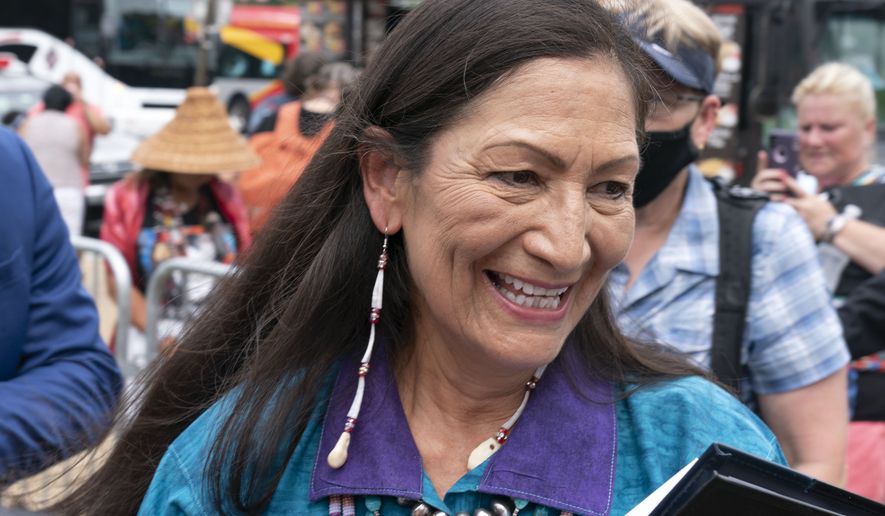Interior Secretary Deb Haaland announced Friday that she would move the Bureau of Land Management headquarters back to Washington, a year after the Trump administration relocated it to Grand Junction, Colorado.
Instead of closing the Grand Junction office, however, she said it would “grow and expand as the bureau’s official Western headquarters” in an apparent compromise with lawmakers on both sides of the aisle who wanted to keep the agency in Colorado.
“There’s no doubt that the BLM should have a leadership presence in Washington, D.C. – like all the other land management agencies – to ensure that it has access to the policy-, budget-, and decision-making levers to best carry out its mission,” Ms. Haaland said in a statement. “In addition, the BLM’s robust presence in Colorado and across the West will continue to grow.”
House Republicans slammed the decision, with Rep. Dan Newhouse of Washington state warning that “the Biden administration’s betrayal of rural America will not be forgotten.”
“Today’s misguided, partisan decision has nothing to do with executing good land management and everything to do with centralizing and growing big government,” said Rep. Bruce Westerman of Arkansas, the top Republican on the House Natural Resources Committee.
He said the “two-quarterback BLM system with one headquarters in D.C. and another headquarters in Colorado will layer bureaucracies, further confusing and complicating an already confused and complicated agency.”
The Trump administration relocated the headquarters last year to put the leadership closer to the Western communities directly affected by its decisions, but federal workers balked, with most refusing to move to the city of 62,000 near the Utah border.
Ms. Haaland said the move “drove hundreds of people out of the agency,” creating a “significant loss of institutional memory and talent.”
She said 328 of the bureau’s D.C.-based slots were reassigned, but only 41 employees relocated, and just three of those moved to Grand Junction. The rest retired or quit, according to the department.
“The past several years have been incredibly disruptive to the organization, to our public servants, and to their families,” Ms. Haaland said. “As we move forward, my priority is to revitalize and rebuild the BLM so that it can meet the pressing challenges of our time, and to look out for our employees’ well-being.”
She met in July with top elected Colorado officials, including Democratic Gov. Jared Polis and Democratic Sens. Michael Bennet and John Hickenlooper, all of whom supported keeping the headquarters in Grand Junction, as well as Republican Rep. Lauren Boebert, who represents the area.
Last week, the House Natural Resources Committee passed a Boebert amendment prohibiting the use of federal funds to close the BLM headquarters in Grand Junction.
BREAKING: @Interior announces plans to move @BLMNational headquarters back to D.C.
— Natural Resources GOP (@NatResources) September 17, 2021
Read Ranking Member @RepWesterman’s statement on this misguided and partisan decision ⬇️ pic.twitter.com/BtlNpsySZp
Ms. Boebert said Colorado’s senators “folded and failed to stand up for Colorado by using procedural tools to leverage the Biden regime to keep the main Bureau of Land Management headquarters, director and senior leadership in Grand Junction.”
“Today’s rushed decision isn’t about helping western communities,” she said. “It is clearly a partisan attack on rural communities. It hasn’t been thought-out, and important questions have yet to be answered, including where will employees that move back to D.C. work?”
The liberal Center for Western Priorities cheered the decision, calling it “the first step in fixing the extensive damage the Trump administration wreaked on the Bureau of Land Management.” “It’s clear that moving the agency’s headquarters out of Washington, D.C., was meant to force out career employees and hollow out its leadership,” said center executive director Jennifer Rokala in a statement.
“The Bureau of Land Management oversees one-tenth of all lands in the United States, and the American people deserve an agency with a seat at the table when important decisions are being made in Washington.”
The agency, which has about 7,000 employees, manages 245 million acres of federal lands, the vast majority in 12 Western states.
• Valerie Richardson can be reached at vrichardson@washingtontimes.com.




Please read our comment policy before commenting.